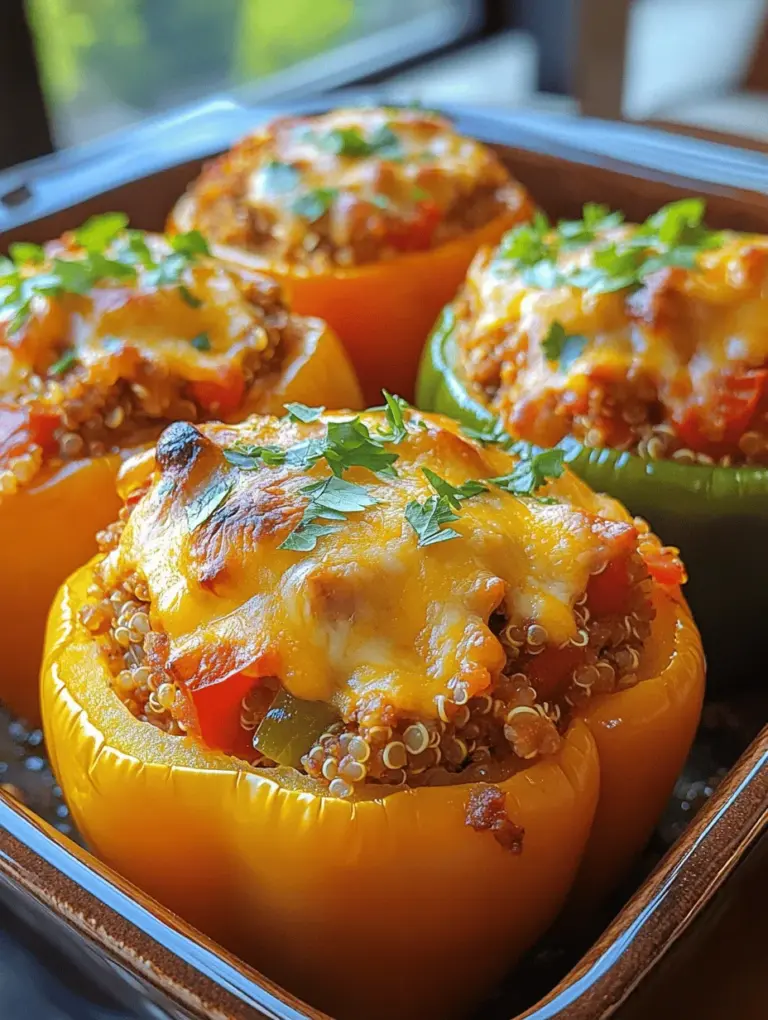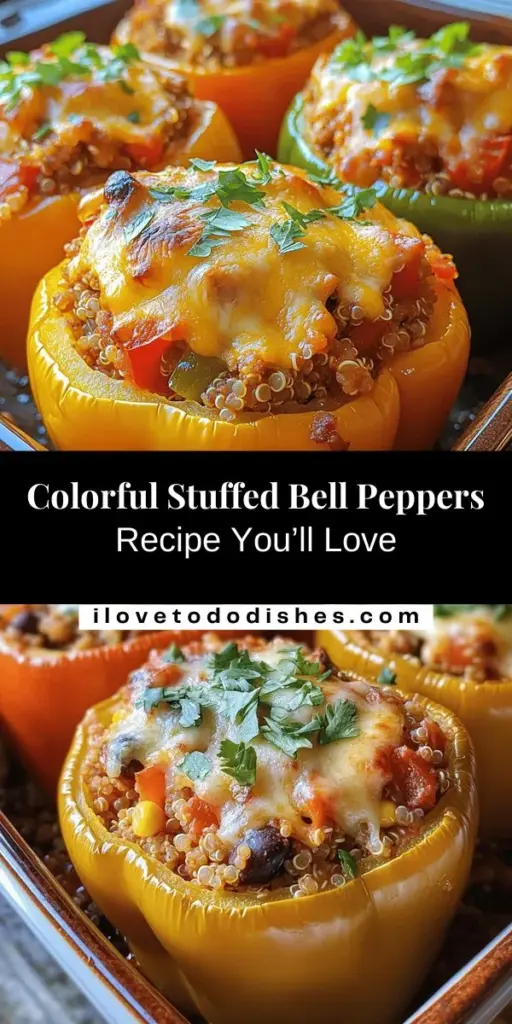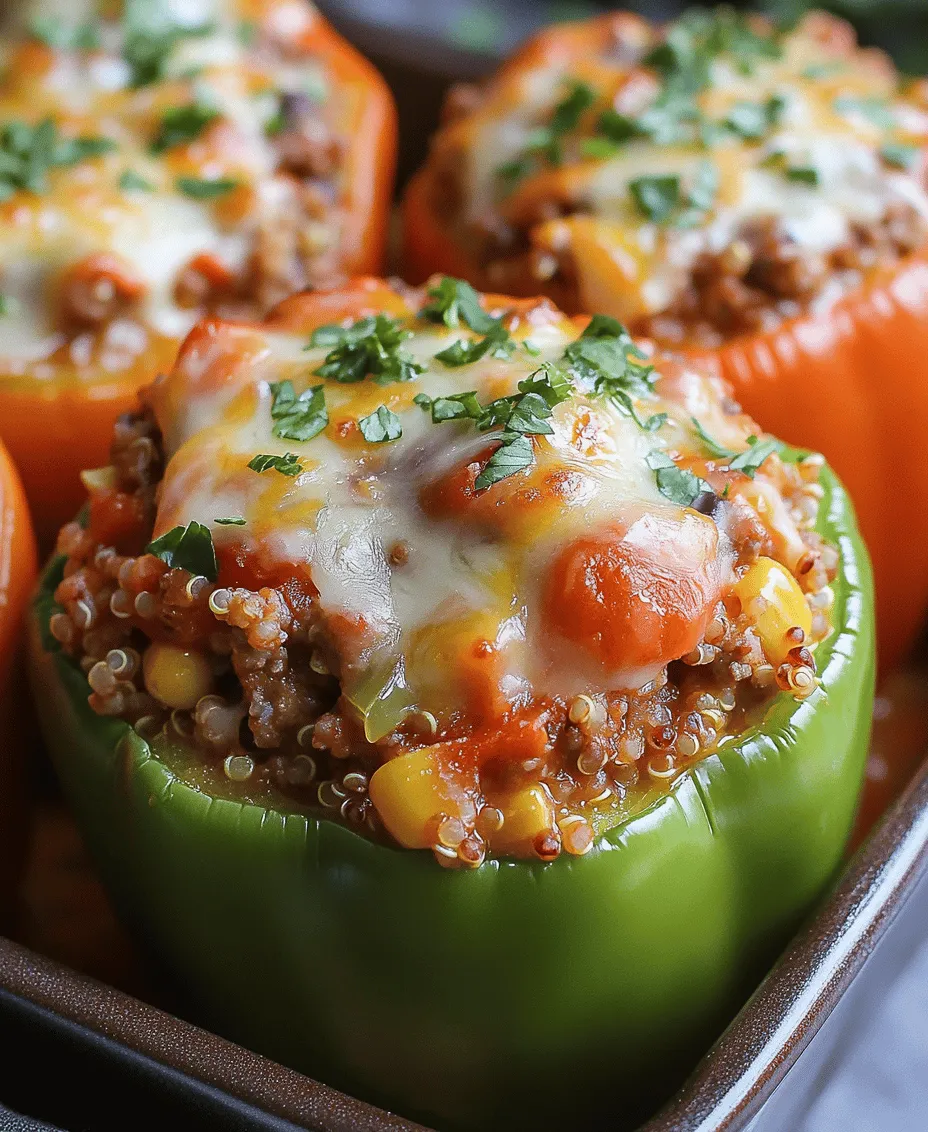Introduction
Stuffed bell peppers are a delightful culinary creation that marries vibrant colors with hearty, nourishing ingredients. This dish not only captivates the eye with its bright hues but also delivers a robust flavor profile that appeals to a wide range of palates. Originating from various global cuisines, stuffed peppers have become a favorite comfort food, often tailored to suit individual tastes and dietary preferences. Whether you’re preparing a weeknight meal for your family or hosting a dinner party, stuffed bell peppers offer versatility and satisfaction in every bite.
One of the standout features of this recipe is its adaptability. You can personalize it by incorporating your favorite proteins, grains, and vegetables, making it an excellent option for meat lovers, vegetarians, and vegans alike. In this article, we will not only delve into the ingredients that make these stuffed peppers so special but also share preparation methods, nutritional benefits, and serving suggestions to elevate your dining experience.
Understanding the Ingredients
The foundation of any great dish lies in its ingredients, and stuffed bell peppers are no exception. To create a colorful and nutritious meal, understanding the components is essential. Let’s explore the key ingredients that contribute to the success of this dish.
Bell Peppers: A Nutritional Powerhouse
Bell peppers are the stars of this recipe, available in a range of colors including red, yellow, green, and orange. Each variety offers unique flavors and nutritional benefits.
– Red Bell Peppers: These peppers are the sweetest of the bunch, offering a delightful crunch and vibrant color. They are packed with vitamins A and C, making them an excellent choice for boosting your immune system.
– Yellow Bell Peppers: With a slightly milder flavor compared to red peppers, yellow bell peppers add a sunny brightness to the dish. They are rich in antioxidants and can help improve eye health.
– Green Bell Peppers: The most common variety, green bell peppers have a slightly bitter taste and are lower in sugar. They are also a great source of vitamin K and beneficial for heart health.
– Orange Bell Peppers: These are similar in sweetness to red peppers but bring a unique flavor profile that complements the dish beautifully. They are rich in vitamin C and can aid in iron absorption.
When selecting fresh peppers, look for firm, smooth skins without blemishes. The peppers should feel heavy for their size and have a vibrant color. Store them in a cool, dry place, and use them within a week for optimal freshness.
Protein Options: Ground Turkey vs. Ground Beef
The choice of protein is crucial in creating a filling and satisfying stuffed pepper. Ground turkey and ground beef are two popular options, each bringing distinct flavors and nutritional profiles to the table.
– Ground Turkey: This lean meat is lower in calories and fat than traditional ground beef. It offers a mild flavor that absorbs the spices and seasonings beautifully. Ground turkey is an excellent choice for those looking to reduce fat intake while still enjoying a hearty meal.
– Ground Beef: For those who prefer a richer flavor, ground beef is an ideal option. It provides a satisfying umami taste and a juicier texture, making it a favorite for many. However, it is higher in fat content, so consider using lean cuts to reduce overall calorie intake.
For those with dietary restrictions or preferences, there are numerous alternatives available. Vegetarian and vegan diets can benefit from options like crumbled tofu, lentils, or tempeh. These ingredients not only provide protein but also add unique textures and flavors to the dish.
Grains and Legumes: Quinoa and Black Beans
Incorporating grains and legumes into your stuffed peppers not only enhances the nutritional value but also adds a delightful texture to the dish.
– Quinoa: This ancient grain is a complete protein, meaning it contains all nine essential amino acids. It is also gluten-free and boasts a nutty flavor. Quinoa cooks quickly and can easily be added to the stuffing mixture, providing additional nutrients and a satisfying bite.
– Black Beans: Rich in fiber and protein, black beans are a fantastic addition to stuffed peppers. They contribute a creamy texture and earthy flavor that complements the other ingredients. Moreover, they are packed with antioxidants and can help regulate blood sugar levels.
Other grains to consider include brown rice, farro, or even barley. Each option offers its own set of health benefits and can be used interchangeably based on your preference.
Vegetables and Spices: Enhancing Flavor and Health
The final touch to your stuffed bell peppers involves the addition of vegetables and spices that elevate the dish’s flavor and nutritional profile.
– Onions and Garlic: These aromatic vegetables form the base of the stuffing. Sautéing onions and garlic brings out their natural sweetness and adds depth to the overall flavor. They are also known for their health benefits, including anti-inflammatory properties and heart health support.
– Spices: The right blend of spices can transform your stuffed peppers from ordinary to extraordinary. Common spices include chili powder, cumin, and smoked paprika. Chili powder adds a mild heat, while cumin introduces an earthy richness. Smoked paprika enhances the flavor with its subtle smokiness, creating a well-rounded taste profile.
– Corn and Tomatoes: Adding corn introduces a sweet crunch, while tomatoes provide juiciness and acidity. Together, they create a harmonious balance that brightens the stuffing and enhances moisture.
Step-by-Step Instructions
To create the perfect stuffed bell peppers, follow these detailed steps that ensure a delicious and satisfying result. We begin with the preparation phase, which lays the groundwork for a successful dish.
Preparation: Prepping the Bell Peppers
The first step in your stuffed pepper journey is selecting and preparing your bell peppers. Here’s how to do it properly:
1. Select Your Peppers: Choose a mix of colors for a vibrant presentation. Aim for medium-sized peppers to ensure they hold enough filling without overwhelming the palate.
2. Slicing and Cleaning: Carefully slice off the tops of each bell pepper and remove the seeds and membranes. This will create a natural bowl for your stuffing. Use a sharp knife for clean cuts and be cautious of your fingers.
3. Brushing with Olive Oil: For added flavor and texture, brush the outside and inside of the peppers with olive oil. This not only enhances the taste but also helps the peppers roast beautifully, creating a caramelized exterior while keeping the insides tender.
4. Pre-roasting (Optional): Some cooks prefer to pre-roast the hollowed peppers for about 10 minutes at 375°F before adding the filling. This step can enhance the flavor and texture of the peppers but is optional based on your preference.
By following these preparation steps, you set the stage for a delightful cooking experience that results in beautifully stuffed and flavorful bell peppers. In the next section, we will dive deeper into crafting the filling, combining all the ingredients to create a mouthwatering dish that will impress anyone at your table.
Stay tuned for the next part of this article, where we will guide you through the filling process and provide tips for achieving stuffed bell peppers that are as delicious as they are colorful.
Cooking the Filling: A Flavorful Medley
Creating the filling for stuffed bell peppers is where the magic begins. The filling acts as the heart of the dish, and its flavor complexity is crucial for a satisfying meal. Start by finely chopping one medium onion and two cloves of garlic. The technique for sautéing these ingredients is essential; heat about two tablespoons of olive oil in a large skillet over medium heat. Once the oil shimmers, add the onions and cook them until they become translucent, about 5-7 minutes. This process releases their natural sweetness and adds depth to your dish.
Next, add the minced garlic and sauté for an additional minute until fragrant. Be careful not to overcook the garlic, as it can turn bitter if browned too much.
Now, it’s time to add your choice of protein. If you’re using ground turkey or beef, ensure it’s broken up into small pieces while cooking. For optimal browning, let the meat sear without stirring for a couple of minutes before turning it. This technique develops a rich flavor and a pleasing texture. After browning, stir the meat occasionally until it is fully cooked, about 6-8 minutes for turkey and a bit longer for beef.
Layering flavors is a vital part of this process. Once the meat is browned, season with salt, pepper, and a blend of your favorite spices—consider cumin, paprika, and dried oregano for a warm and aromatic profile. You can also add diced tomatoes or tomato sauce, which will not only enhance the flavor but also help bind the mixture together. If you want to sneak in some veggies, consider adding chopped zucchini or mushrooms at this stage. After everything is mixed well and heated through, remove the skillet from heat and allow the filling to cool slightly before stuffing the peppers.
Stuffing the Peppers: The Art of Filling
Achieving the perfect stuffing consistency is essential for stuffed bell peppers. The filling should be moist but not overly wet, as excess moisture can lead to soggy peppers. A good rule of thumb is to let the filling cool for a few minutes before stuffing; this will also help prevent the peppers from wilting during the cooking process.
To stuff the peppers, place each hollowed pepper upright in a baking dish. Using a spoon, carefully scoop the filling into each pepper, pressing down gently to pack it in without overstuffing. It’s important to leave a little space at the top, as the filling may expand slightly during cooking. Continue this process until all the peppers are filled.
To ensure an even distribution of the filling, use a large spoon or a small ice cream scoop. This tool not only makes the process easier but also helps you measure out equal portions, ensuring each pepper has a similar flavor profile.
Baking: Achieving the Perfect Texture
Baking stuffed bell peppers requires attention to detail, particularly concerning steam and temperature. Preheat your oven to 375°F (190°C) to ensure an even cooking environment. Place the stuffed peppers in a baking dish and add a bit of water to the bottom of the dish—about half a cup. This addition is crucial, as it creates steam during baking, which helps the peppers cook evenly and maintain their shape.
Cover the baking dish with aluminum foil to trap the steam effectively. Bake the peppers for about 30 minutes, then remove the foil and continue baking for an additional 10-15 minutes. This uncovered phase allows the tops of the peppers to caramelize slightly, enhancing their flavor and giving a lovely texture contrast. The peppers should be tender but still hold their shape when done.
Serving Suggestions
Once your stuffed bell peppers are beautifully baked, it’s time to serve them up. There are many delightful ways to present this colorful dish to make it even more appealing.
Presentation Ideas
For creative plating, consider serving the stuffed peppers on a vibrant platter that highlights their colors. You can also slice a couple of peppers in half to display the filling beautifully and arrange them on the plate. This not only enhances the visual appeal but also makes it easier for guests to serve themselves.
For garnishes, fresh herbs like parsley, cilantro, or basil can add a pop of color and freshness. You might also sprinkle some shredded cheese over the top before baking for a cheesy finish or add a dollop of sour cream or Greek yogurt for creaminess.
Pairing Options
To complement your stuffed peppers, various side dishes can enhance the meal. A simple mixed green salad drizzled with a light vinaigrette balances the richness of the filling. Alternatively, a side of quinoa or brown rice can add heartiness to your meal.
For beverage pairings, consider serving a light-bodied red wine like Pinot Noir or a refreshing iced tea to cleanse the palate. If you prefer non-alcoholic options, a sparkling water with a slice of lemon or lime can add a refreshing touch.
Nutritional Benefits of Stuffed Bell Peppers
Stuffed bell peppers are not just a feast for the eyes; they pack a nutritional punch as well. Bell peppers are rich in vitamins A and C, promoting healthy skin and supporting the immune system. The addition of lean protein from turkey or beef provides essential amino acids, making this dish a wholesome choice.
Balanced Nutrition: A Complete Meal
To break down the macronutrients, a typical stuffed bell pepper (with ground turkey and brown rice) offers a balanced combination of protein, carbohydrates, and healthy fats. Each serving contains approximately 25 grams of protein, 30 grams of carbohydrates, and 10 grams of fat, depending on the specific ingredients used.
In terms of vitamins and minerals, you can expect to get a good dose of fiber, potassium, and antioxidants from the bell peppers and any additional vegetables included in the filling. The portion sizes can be adjusted to meet different dietary needs; for example, those looking to reduce carbohydrates can simply skip the rice or substitute it with cauliflower rice.
Conclusion
Stuffed bell peppers are not just a feast for the eyes; they are a celebration of flavors and nutrition. This dish brings together a diverse range of ingredients that can easily be customized to suit various dietary preferences. By following this recipe, you can create a colorful and comforting meal that is sure to please everyone at your table. Whether as a weeknight dinner or a special gathering, stuffed bell peppers offer a delightful culinary experience that embodies health and satisfaction. Enjoy the vibrant flavors and textures that this dish has to offer!



